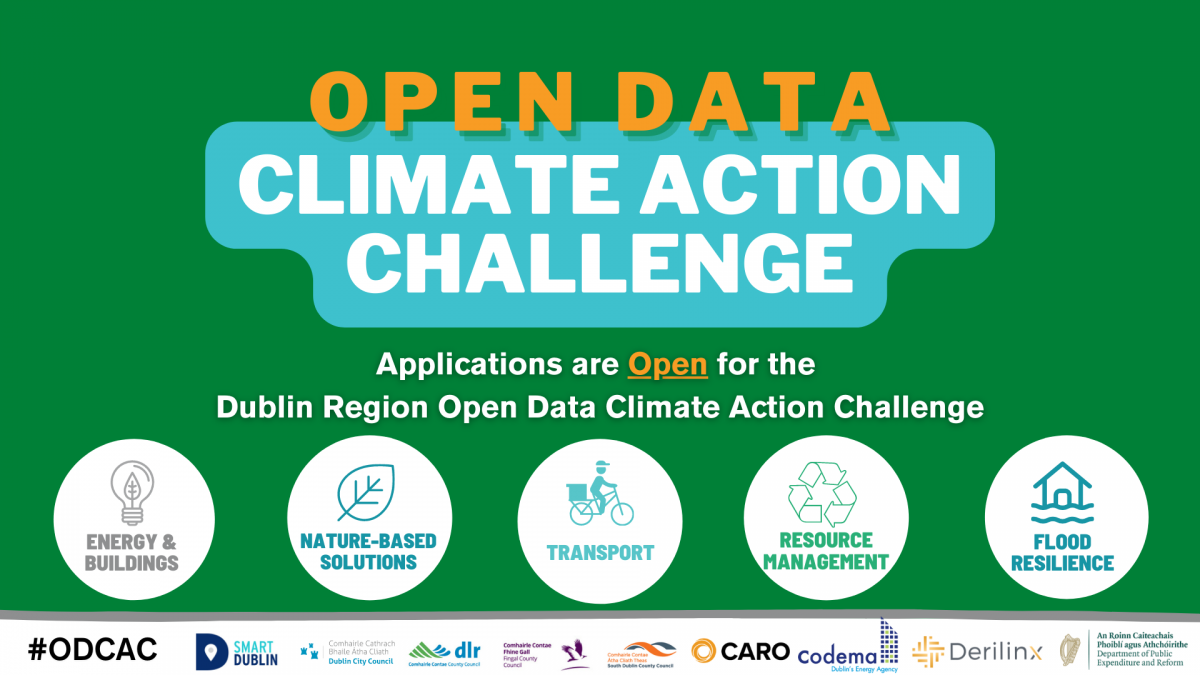
The Dublin Region Climate Action Challenge seeks innovative ideas and applications that use open data to drive and support climate action. Entry is open to individuals and groups of all ages and backgrounds through completing a short application form for a top prize of €5,000 with a €1,000 award available for each shortlisted entry.
This challenge is organised by Smart Dublin, the Climate Action Offices of the Dublin Local Authorities (DLAs): Fingal, Dún Laoghaire-Rathdown, South Dublin and Dublin City; the Dublin Metropolitan Climate Action Regional Office (CARO), Codema, and Derilinx. Funding is provided by these organisations and from DPER’s Open Data Engagement Fund.
The challenge organisers realise human induced climate change is the most pressing challenge of our time. Yet it is a complex issue with many interdependencies and uncertainty, necessitating broad participation in potential solutions. However, developments in knowledge, technology and modes of communication enable new opportunities to understand and address its causes and consequences. Data, modelling and visualisation are key to such developments and play a significant role in measuring emissions, calculating offsets, locating adaptive interventions, etc. Some of this data is available openly, for example as open data published on the Dublin region and National open data portals.
The organisers are looking for challenge participants to use available data to develop analyses, applications, tools, maps, etc. which can drive or support climate action in some shape or form. All data-based proposals with the potential to contribute to climate action are welcome. However, alignment with the DLA Climate Change Action Plans 2019-2024 is of interest. For example, your proposal might fall under one of the Plans’ five themes:
- Energy & buildings: e.g., how can existing data and analysis for energy and buildings be used to increase engagement of citizens and businesses in climate action? What are the opportunities for visual representation of renewable energy consumption/microgeneration/energy efficiency potential of buildings? How could the energy transition transform the lives of citizens?
- Nature Based Solutions & Biodiversity: nature provides valuable ecosystem services such as clean air and water, food and medicine, recreation, and climate regulating services (i.e., temperature). How can we use data to protect, improve and increase access to nature and realise the multiple benefits of NBS and biodiversity while increasing resilience to climate change?
- Flood Resilience: e.g., how will increased rainfall, extreme weather events, sea level rise and coastal erosion affect the Dublin region? How will changing coastlines impact on coastal communities? How can data and its applications increase awareness of various forms of flooding, and inform interventions such as Sustainable Urban Drainage Systems, Green Infrastructure and other climate resilient solutions?
- Transport: e.g., how can data be used to help drive the uptake of active travel, public transport or other shared mobility (e.g.) car sharing? How can data/solutions inform the locations for remote working hubs and increase the awareness and usage of remote working hubs? How can data inform/influence targets around the switchover to Electric Vehicles?
- Resource management and circular economy: we must transition from our existing take-make-waste system to a circular economy. How can data help monitor this transition (e.g.) improve recycling levels or reduce waste by households and businesses? How can data help encourage sectors to become more circular? Can we demonstrate how moving to a circular economy will impact on climate change?
Your proposal could also help visualise or benchmark progress toward climate action goals within or beyond the above themes. We are also interested in how open data can help us connect with and inspire action from our citizens and communities. For example, is there scope for cooperation between citizen science and official published data to drive climate action? What does a ‘day in the life’ climate impact by citizens look like and how can data help us take climate informed decisions (e.g.) when shopping, travelling, eating and drinking, etc.? Finally, we recognise that climate action requires collaboration so we encourage solutions that are interdisciplinary and contribute to a just transition. This means taking into consideration factors such as age, gender, race and socio-economic status, to ensure the impacts of proposed solutions are inclusive and equitable. We also encourage diversity in the individuals and teams participating in the challenge.
More information can be found on the Smart Dublin website here or by emailing Luke Binns of Smart Dublin at luke.binns@smartdublin.ie.
.
